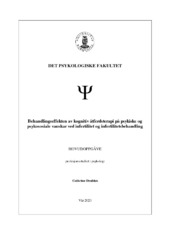Behandlingseffekten av kognitiv åtferdsterapi på psykiske og psykososiale vanskar ved infertilitet og infertilitetsbehandling
Master thesis
Permanent lenke
https://hdl.handle.net/1956/22738Utgivelsesdato
2020-06-19Metadata
Vis full innførselSamlinger
Sammendrag
Infertilitet og infertilitetsbehandling er assosiert med stor grad av påkjenning og kan ha implikasjonar for sosiale og romantiske relasjonar, livskvalitet og psykisk helse hjå personar og par som opplev dette. Mange opplev betydelege vanskar og er i behov av psykologisk oppfølging. Hensikten med denne litteraturgjennomgangen var å gjennomgå forsking som undersøkte effekten av kognitiv åtferdsterapi (KAT) som behandlingsmetode ved psykiske og psykososiale vanskar som kan oppstå hjå infertile individ under infertilitetsbehandling. Åtte artiklar blei inkludert etter eit systematisk litteratursøk i anerkjente databasar. Kun randomiserte og kontrollerte studiar blei inkludert. Resultata viste at KAT hadde ein positiv effekt på angst, seksuelle vanskar og generelt psykisk ubehag og livskvalitet. Effekten var mindre konsistent ved depressive vanskar og infertilitetsrelatert stress og vanskar, der gjennomgangen viste til sprikande og inkonsistente funn. KAT hadde vidare implikasjonar for deltakarane sin meistringsstil og bruk av meistringsstrategiar og fremja hardiness i møte med infertilitet. Samla sett viste resultata til ein overordna positiv effekt av KAT på psykiske og psykososiale vanskar ved infertilitet. Funn må likevel tolkast med forsiktigheit, med bakgrunn i metodiske svakheiter og variasjon i utfallsmål og behandlingsinnhold i inkluderte studiar. Berre éin studie inkluderte mannlege deltakarar, som er ei viktig problemstilling til vidare forsking. Infertility and fertility treatments are associated with great distress and can affect a couple or a person’s social and romantical relations, quality of life and mental health. Many experience distress of considerable degree and are in need of psychological treatment. The aim of this review is to summarize current data on the effect of cognitive behavioral therapy (CBT) as a treatment option for infertile individuals experiencing psychological or psychosocial difficulties when facing fertility treatment. Eight articles were included after a systematic literature search in peer reviewed databases. Only randomized controlled trials were included. The results show that CBT had a positive effect on anxiety, sexual function, general distress and quality of life. CBT was less consistent in alleviation of depressive symptoms and infertility-related distress, where the findings were inconclusive. CBT influenced participants’ coping style and was effective in promoting hardiness when facing infertility. Taken together, the results indicate an overall positive effect of CBT in reducing psychological or psychosocial distress during infertility. The findings must be interpreted with caution, as methodical weaknesses and variation in interventions and outcome measures used weaken the generalizability of findings. Only one study included male participants, which should be an important focus in further research.
